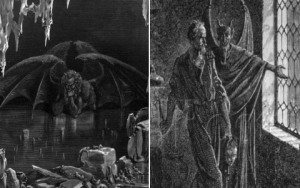Death and the Fool are two distinct cards in the Tarot, each carrying significant symbolic weight. They represent transformative experiences, though approached from different angles.
Death
- Not Literal Death: Often misinterpreted, Death rarely signifies physical death. It primarily symbolizes the end of a cycle, a release, or a major transformation.
- Change and Transformation: It indicates the need to let go of old beliefs, habits, or relationships that no longer serve you.
- Inevitable: Death suggests that change is inevitable and should be embraced rather than feared. Resistance to change can lead to stagnation.
- New Beginnings: The end of one cycle paves the way for new opportunities and growth.
The Fool
- New Beginnings and Potential: The Fool represents new beginnings, innocence, and limitless potential. It signifies embarking on a journey without the baggage of past experiences.
- Trust in the Universe: The Fool encourages trust in the universe and a willingness to take risks.
- Lack of Experience: It can also suggest naivety, recklessness, and a lack of awareness of potential dangers.
- Spontaneity: Embracing spontaneity and living in the moment are key aspects of The Fool's energy.
Interaction and Juxtaposition
While seemingly disparate, Death and The Fool can represent sequential stages or contrasting approaches to life's challenges.
- Releasing the Old to Embrace the New: Death can clear the path for The Fool's journey. The ending of a significant phase (Death) can liberate you to begin a fresh, unburdened adventure (The Fool).
- Opposing Forces: They can also represent opposing forces within oneself. The desire for stability and control (resisting Death) versus the urge for freedom and exploration (The Fool).
- Transformation and Growth: Both cards ultimately lead to growth. Death through necessary endings, and The Fool through new experiences and learning.
Conclusion:
Understanding Death and The Fool involves recognizing the cyclical nature of life, embracing change, and trusting in the journey, even when it seems uncertain. They offer complementary perspectives on transformation and personal evolution.







